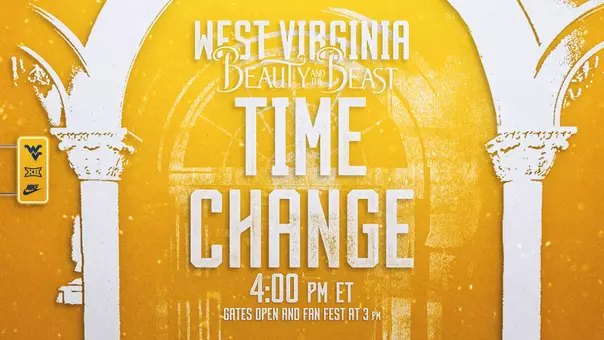Tales from the Backyard Brawl
December 01, 2007 12:10 PM | General
December 1, 2007
1895: Coach Fielding “Hurry Up” Yost and a bunch of professional ringers led West Virginia to an 8-0 victory over Western University of Pennsylvania in Wheeling in the first-ever game between these two border rivals.
1901: The Western University of Pennsylvania (WUP), later to become the University of Pittsburgh, registered its first win against West Virginia, a 12-0 victory in Pittsburgh.
1904: Pitt defeated West Virginia, 53-0. It marked the first – and only – time that Pitt scored at least 50 points in a Backyard Brawl until the 1978 Panthers beat WVU, 52-7.
1908: Homer Jones returned an interception 105 yards for a touchdown during Pitt’s 11-0 win in Pittsburgh.
1917: Coach Pop Warner’s first encounter with West Virginia is a successful one, a 14-9 Pitt win in Morgantown.
1920: Tom Davies had a cumulative 139 yards on punt returns during Pitt’s 34-13 win at Forbes Field.
1921: Pittsburgh’s Forbes Field is the site of what is believed to be the first commercial radio broadcast of a college football game. Harold Arlin was behind the microphone for the Panthers’ 21-13 win.
1922: Armin Mahrt’s drop kick field goal defeats Pitt 9-6 in Pittsburgh.
1923: West Virginia beats Pitt for the second straight year in Pittsburgh, 13-7, with George Hill scoring both touchdowns.
1924: Pitt beat West Virginia, 14-7, in Jock Sutherland’s first season as coach of the Panthers.
1927: Parkersburg’s Gibby Welch, a Pitt standout, returned a kickoff 105 yards for a score in the Panthers’ 40-0 win at Pitt Stadium.
1928: Eddie Bartug stepped in front of a Charles Edwards pass and returned the interception 47 yards to the Panther four and three plays later Nelson Lang scored the go-ahead touchdown in a 9-6 West Virginia victory. It was the only time legendary coach Jock Sutherland ever lost to West Virginia or Penn State.
1930: Pitt’s first trip to Mountaineer Field is a happy win for fans of the Panthers – a 16-0 victory.
1933: Henry Weisenbaugh’s 80-yard TD scamper helped Pitt to a 21-0 win in Morgantown.
1936: Leo Malarkey broke free on an 80-yard touchdown run in Pitt’s 34-0 victory at Pitt Stadium.
1937: Elkins, W.Va. native son Marshall Goldberg leads Pitt – that season’s Associated Press national champion – to a 20-0 win at Mountaineer Field.
1938: It’s the “Year of the Dream Backfield” at Pitt, which prevails against WVU, 19-0.
1942: For a third straight year West Virginia is off Pitt’s schedule for money the Mountaineers owed Pitt for guaranteed games played a decade ago in Morgantown. WVU was nearly broke then and owed Pitt the substantial sum of $20,000. West Virginia came back on Pitt’s schedule when gasoline rationing was instituted during World War II.
1943: Pitt beat West Virginia 20-0 at Pitt Stadium, following a three-year hiatus in the series. The school did not play each other (1940-42) during Bill Kern’s first stint as WVU coach. Kern had been an All-America player at Pitt and later served as an assistant coach to Jock Sutherland.
1946: Lou “Bimbo” Cecconi returned a punt for a score in Pitt’s 33-7 win at Pitt Stadium. WVU was coached by former Pitt player and aide Bill Kern.
1947: West Virginia snapped Pitt’s 19-year winning streak with a 17-2 victory in Pittsburgh. WVU coach Bill Kern, a Pitt graduate, informed the team before the game that he was resigning to enter private business.
1947: Gene Corum, later a West Virginia coach, returned a Panther fumble for what he thought was the only touchdown of his career. When the snow was removed from the field he wound up being tackled at the 10 yard line.
1947: Legendary “Voice of the Mountaineers” Jack Fleming describes his first Backyard Brawl.
1949: The Panthers contain fullback Pete Zinaich in a 20-7 win at Mountaineer Field.
1950: West Virginia coach Art “Pappy” Lewis’ introduction to the Backyard Brawl in 1950 was an unkind one with Pitt claiming a 21-7 triumph.
1952: West Virginia recorded its first-ever victory over a ranked team when the Mountaineers knocked of 18th-rated Pitt in Pittsburgh.
1954: The 2-3 Panthers upset the undefeated Mountaineers, 13-10, in Morgantown, winning the game on a touchdown pass by Corny Salvaterra.
1955: West Virginia came to Pittsburgh riding an 11-game winning streak, but the sixth-ranked Mountaineers were upset by a fired-up Pitt squad, 26-7, led by the defensive play of end John Paluck.
1955: Following West Virginia’s disappointing 26-7 loss to Pitt Fairmont writer Bill Evans called WVU’s journey back to Morgantown, “the longest funeral procession in history.”
1958: West Virginia produced a memorable 23-15 upset over a Mike Ditka-led Pitt team that was supposed to have been better than the Mountaineers at every position.
1961: West Virginia defeated Pitt 20-6 in what has become known as the “Garbage Game.” Pitt News writer Jim O’Brien quoted a Panther player as saying that West Virginia was rebuilding its football program with “Western Pa garbage.”
1963: Paul Martha’s 46-yard touchdown run in the fourth quarter gave the Panthers a 13-10 win at Mountaineer Field, and kept the Panthers undefeated. They would lose to Roger Staubach and Navy the following week, and finish the season with a 9-1 record.
1963: The centennial year for West Virginia saw one of the few occasions when brother played against brother in the Backyard Brawl. Richie Martha’s brother Paul scored the game’s winning touchdown for the Panthers.
1965: Eric Crabtree’s three-touchdown (43-yard reception, 71-yard run and 92-yard kickoff return) performance went for naught as WVU outscored the Panthers, 63-48, at Mountaineer Field.
1965: Garrett Ford’s 356 all-purpose yards established a school record that still exists in WVU’s 63-48 conquest of Pitt in Morgantown.
1965: Quarterback Allen McCune completed 18 of 28 passes for 320 yards and five touchdowns in West Virginia’s 63-48 victory over Pitt.
1966: Dave Hart’s first win as Pitt’s new coach was a 17-14 decision at Pitt Stadium in his first Backyard Brawl.
1967: Bethel Park’s Ken Juskowich’s five field goals do in Pitt 15-0 in Morgantown.
1968: Mike Sherwood passes for a school-record 416 yards and two touchdowns to lead West Virginia to 38-15 victory in Pittsburgh.
1969: Dave Garnett had 220 yards in kickoff returns, but WVU defeated Pitt, 49-18 at Mountaineer Field in the first Backyard Brawl played on artificial turf.
1969: For the first time since the late 1890s, West Virginia defeated Pitt three straight times. Quarterback Mike Sherwood and Eddie Williams each ran for more than 100 yards in the victory.
1970: Dave Havern’s five-yard scoring pass to Bill Pilconis caps Pitt’s comeback from a 35-8 halftime deficit to beat the Mountaineers, 36-35, at Pitt Stadium.
1970: First-year West Virginia coach Bobby Bowden learns a hard lesson in sitting on the football in a humiliating 36-35 loss to Pitt after his team blew a 27-point halftime lead.
1971: West Virginia’s 20-9 victory over Pitt in Morgantown in 1971 marked the fourth victory in five years against the Panthers dating back to 1967.
1972: Danny Buggs’ five-catch, 115-yard performance helped West Virginia to a 38-20 victory over Pitt in Morgantown.
1973: Freshman Tony Dorsett rushed for three touchdowns as Pitt defeated the favored Mountaineers, 35-7, at Mountaineer Field.
1974: Tony Dorsett carried the ball 38 times – a Pitt single-game record at the time – during the Panthers’ 31-14 victory at Pitt Stadium.
1974: Artie Owen’s 15-carry, 112-yard performance was overshadowed by Pitt’s Tony Dorsett, who led the Panthers to a 31-14 win.
1974: Bill Hillgrove called his first Backyard Brawl as radio “Voice of the Panthers.”
1975: Bill McKenzie kicks a 38-yard field goal on the final play of the game to lead West Virginia to a 17-14 victory.
1975: The Pitt-WVU “Backyard Brawl” in Morgantown is televised (ABC-Regional) for the first time since 1963.
1975: Tony Dorsett has his lowest rushing output in four career games against West Virginia and endures his only loss to the Mountaineers.
1976: Pitt entered the Backyard Brawl ranked No. 1 in the nation (AP) for the first time since 1939.
1976: Frank Cignetti, a former Pitt assistant coach, coaches his first Backyard Brawl on the Mountaineer sidelines and comes within nine points of upsetting the No. 1-rated Panthers. It was Pitt’s closest result during an undefeated season.
1976: Placekicker Carson Long became the NCAA’s all-time scoring leader and Tony Dorsett rushed for 199 yards – before being ejected in the fourth quarter – as No. 1 Pitt improved to 10-0 with a hard-fought 24-16 win against WVU at Pitt Stadium.
1977: Pitt’s 44-3 win at Mountaineer Field in Jackie Sherrill’s first season as Pitt’s coach remains the Panthers’ most lopsided win in Morgantown during the rivalry.
1978: Tailback Ray “Rooster” Jones and the Pitt offense broke out for a season-high 52 points in a 52-7 defeat of WVU at Pitt Stadium.
1979: Freshman quarterback Dan Marino directed Pitt to a 24-17 victory in the final college football game played at old Mountaineer Field.
1980: Starting free safety Rick Trocano moved over to offense in the second quarter to replace the injured Dan Marino, and led Pitt to four second-quarter touchdowns during the Panthers’ 42-14 win at Pitt Stadium.
1980: West Virginia had just three days to prepare for No. 2-rated Pitt after making a midseason trip to Hawaii.
1980: Don Nehlen is introduced to the Backyard Brawl with a 42-14 loss to the Panthers. It was the worst defeat a Nehlen-coached West Virginia team endured against Pitt.
1981: With Danny Daniels starting at quarterback in place of the injured Dan Marino, Pitt failed to complete a single pass, but still won the game, 17-0, at Mountaineer Field.
1982: Dan Marino’s six-yard scoring pass to Julius Dawkins rallied Pitt from a 13-0 fourth-quarter deficit on its way to a 16-13 win at Pitt Stadium, the Panthers’ seventh straight in the Backyard Brawl.
1982: The country was introduced to All-American linebacker Darryl Talley, who intercepted a Dan Marino pass and blocked a punt for a safety in West Virginia’s 16-13 loss to the No. 2-rated Panthers.
1982: The 1982 game was one of just five times both teams were nationally ranked: Pitt was rated No. 2 and West Virginia was 14th after upset wins over Oklahoma and Maryland.
1983: West Virginia drove 90 yards on 14 plays – 13 of them runs – against Pitt’s No. 1-ranked defense to snap the Panthers’ seven-game winning streak 24-21 in 1983.
1984: Willie Drewery’s 74-yard punt return for a touchdown helps West Virginia to an easy 28-10 victory at Pitt in 1984.
1985: The two teams played to a 10-10 tie in Morgantown in one of more non-descript games in Backyard Brawl history. It was the first tie in the series since 1909.
1986: Mike Gottfried won his first Backyard Brawl as coach of the Panthers by a 48-16 count at Pitt Stadium.
1987: Neither team scored a touchdown, but Jeff VanHorne booted a pair for Pitt as the Panthers won in Morgantown, 6-3. It’s the last time a touchdown wasn’t scored in a Backyard Brawl.
1988: Skeptical that West Virginia was for real and installed as a one-point underdog by the odds makers, the Mountaineers rolled to a 31-10 victory over Pitt on the way to their first undefeated, untied regular season in school history.
1989: In the first Backyard Brawl played at night, Eddie Frazier’s 42-yard field goal as time expired capped a Pitt rally that saw the Panthers erase a 31-9 fourth quarter deficit and produce a 31-31 tie.
1990: Panther Ricky Turner returned a kickoff 100 yards for a touchdown, but West Virginia beat the Panthers, 38-24, at Pitt Stadium. It’s the last time a kickoff was returned for a score in the Backyard Brawl.
1991: Sean Gilbert returned an interception for a touchdown as Pitt beat WVU, 34-3, in the first-ever Big East Conference game for both schools.
1991: West Virginia’s plans to use a no-huddle, shot-gun offense were thwarted when quarterback Darren Studstill went down with a shoulder injury in the first quarter.
1992: West Virginia registered a 44-6 beating in one of Pitt’s worst home defeats in Backyard Brawl history.
1993: Johnny Majors’ second go-around at Pitt wasn’t nearly as successful, dropping a 42-21 decision to West Virginia in Morgantown on the way to losing four straight to the Mountaineers by a combined score of 154-62.
1993: Curtis Martin broke loose for an 86-yard run – not a touchdown – but Pitt lost to the unbeaten Mountaineers in Morgantown, 42-21.
1994: Dietrich Jells set a Pitt single-game record with 225 receiving yards in this Backyard Brawl at Pitt Stadium.
1994: John Ryan ran for a two-point conversion to give Pitt a 41-40 lead late in the contest after Pitt had trailed 31-6 in the second quarter. The Mountaineers eventually won this Brawl, 47-41.
1994: Chad Johnston hit Zach Abraham for a 60-yard touchdown with 15 seconds left to beat Pitt 47-41. Johnston passed for a career-high 396 yards.
1996: Amos Zereoue took his very first college carry 69 yards for a touchdown in West Virginia’s season-opening 34-0 victory over Pitt. It was the only time West Virginia has managed back-to-back shutout losses against the Panthers.
1997: Pete Gonzalez completed a fourth-and-17 pass to Jake Hoffart that set up the game-winning strike to Terry Murphy in Pitt’s dramatic 41-38 triple-overtime win at Mountaineer Field, sending the Panthers to their first bowl game since the 1989 season.
1997: Amos Zereoue’s 151-yard rushing performance was wiped out in Pitt’s 41-38 triple-overtime loss to Pitt. It was the first overtime game in Backyard Brawl history.
1997: Current radio voice Tony Caridi describes his first Backyard Brawl for the Mountaineer Sports Network.
1998: For the first time since 1982 (vs. North Carolina), Pitt hosts a home game at a venue other than Pitt Stadium. The Mountaineers spoil the occasion, winning 52-14 at Three Rivers Stadium.
1998: Hometown product Marc Bulger torched Pitt’s secondary for 409 yards and six touchdowns in West Virginia’s 52-14 victory over the Panthers.
1999: Marc Bulger capped off a brilliant career with a 20-of-30, 331-yard passing performance in West Virginia’s 52-21 triumph over Pitt to end the 1999 season. Freshman Avon Cobourne ran for a season-high 210 yards in the win.
2000: In the final college football game played at Three Rivers Stadium – Pitt Stadium had been demolished earlier in the year – Kevan Barlow ran for a Backyard Brawl single-game record 272 yards in Pitt’s 38-28 victory.
2001: Antonio Bryant caught 11 passes – one for a touchdown – to give Pitt a 23-17 win at Mountaineer Field, keeping Pitt’s bowl hopes alive (5-5) following a 1-5 start to the season.
2002: Larry Fitzgerald caught a Heinz Field single-game record 11 passes in the Panthers’ 24-17 loss.
2002: Pittsburgh native Rasheed Marshall’s 74-yard touchdown pass to Connelsville’s Phil Braxton was the deciding score in West Virginia’s 24-17 victory at Pitt in Heinz Field.
2003: Rod Rutherford passed for a career-high 419 yards at Mountaineer Field.
2003: Quincy Wilson rumbled for 208 yards rushing to help West Virginia to a 52-31 victory over Pitt in Morgantown. It was the last time both teams played a Backyard Brawl nationally ranked.
2004: Tyler Palko’s fourth-quarter touchdown run gave Pitt a 16-13 win on Thanksgiving Night at Heinz Field.
2004: Without suspended wide receiver Chris Henry, West Virginia’s BCS bowl hopes went up in flames at Pittsburgh, 16-13 in a game the Mountaineers led until the fourth quarter.
2005: Freshman quarterback Patrick White ran for 220 yards in leading West Virginia to a 45-13 victory over Pitt on frozen Milan Puskar Stadium. At halftime when asked what his team could do to stop West Virginia’s rushing attack Pitt coach Dave Wannstedt infamously said, “Run faster.”
2006: Steve Slaton and Patrick White became just the third tandem in NCAA history to rush for more than 200 yards in the same game in West Virginia’s 45-27 victory at Pitt.
2006: Patrick White became only the ninth player in NCAA history to rush and pass for more than 200 yards in the same game in West Virginia’s 45-27 win over Pitt.
2006: Kicker Pat McAfee’s 51-yard field goal was the longest in Heinz Field history by either a professional or a collegian.
Sam Scuillo, Jr., a 1981 Pitt graduate, was a member of the Pitt sports information office for seven years. He has authored four books about Pitt football and basketball.















